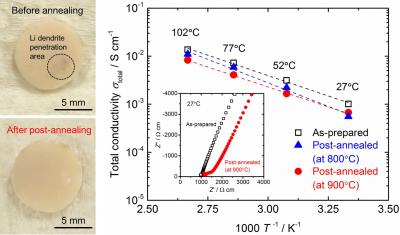Post-annealing effect for healing Li garnet solid electrolyte degraded by Li dendrite penetration

Credit: COPYRIGHT (C) TOYOHASHI UNIVERSITY OF TECHNOLOGY. ALL RIGHTS RESERVED.
Overview:
A research team in the Department of Electrical and Electronic Information Engineering at Toyohashi University of Technology and the Department of Chemistry at University of Calgary has investigated the effect of post-annealing for healing Li garnet solid electrolyte degraded by the growth of Li dendrites. The ionic conductivity of the annealed solid electrolyte was slightly lower than that of the electrolyte before annealing but was retained above 10?4 S cm?1 at room temperature. The electrochemical results obtained indicate the possibility of reusing the solid electrolyte degraded by the growth of Li dendrites in another all-solid-state Li battery.
Details:
A research team in the Department of Electrical and Electronic Information Engineering at Toyohashi University of Technology and the Department of Chemistry at University of Calgary has investigated the effect of post-annealing for healing Li garnet solid electrolyte degraded by the growth of Li dendrites. The ionic conductivity of the annealed solid electrolyte was slightly lower than that of the electrolyte before annealing but was retained well above 10?4 S cm?1 at room temperature. The electrochemical results obtained indicate the possibility of reusing the solid electrolyte degraded by the growth of Li dendrites in another all-solid-state Li battery. The results of their research have been published in ACS Applied Energy Materials on December 7, 2020.
The development of solid inorganic lithium-ion conducting materials for utilization as solid electrolytes is crucial for the development of highly safe and reliable next-generation all-solid-state lithium (Li) batteries. Among various oxide-based solid electrolyte materials, a garnet-type oxide with the formula of Li7La3Zr2O12 (LLZO) has attracted considerable attention because of its high Li-ion conductivity at room temperature, excellent thermal performance, and high stability against Li metal.
Although the use of Li metal with large gravimetric theoretical capacity (=3,860 mAh g?1) and the lowest redox potential as a negative electrode leads to the high energy density of batteries, the formation of a solid?solid interface between LLZO and the Li metal electrode is a major drawback. Poor interfacial connection causes non-uniform Li plating and intergranular penetration of Li dendrite in polycrystalline LLZO. This effect is prominent when the battery is cycled particularly at high current densities, resulting in an internal short-circuit failure.
Certainly, the establishment of prevention technology for short-circuit failures is widely researched for the development of all-solid-state batteries with Li metal as a negative electrode. Conversely, from the viewpoint of effective use of material resources, the possibility of reusing LLZO extracted from a solid-state battery after the occurrence of a short-circuit failure is worth considering. If the amount of Li dendrite propagating in LLZO is small and the short-circuit area is highly localized, LLZO may be reused by removing the Li dendrite therein.
For the first time, a research team in the Department of Electrical and Electronic Information Engineering at Toyohashi University of Technology and the Department of Chemistry at University of Calgary has investigated the reusability of a garnet-type Ta-substituted LLZO (Ta-LLZO) ceramic solid electrolyte shorted or degraded by Li metal penetration during electrochemical Li plating/stripping testing for a Li/Ta-LLZO/Li symmetric cell.
Ta-LLZO was removed from a tested cell after the degradation via Li dendrite penetration had occurred and then Li metal electrodes attached with Ta- LLZO were removed in ethanol. After that, Ta-LLZO was annealed in air at 800-900 ºC for several hours. It was confirmed that annealed Ta-LLZO shows slightly lower Li ion conductivity compared with that of as-prepared one but maintains the conductivity well above 10?4 S cm?1 at room temperature. The slight decrease in the conductivity of annealed Ta-LLZO is mainly attributed to the formation of impurity phases and structural changes near the end surface of Ta-LLZO, and the degree of degradation depends on the area size for Li dendrite penetration. Furthermore, Li plating/stripping in another symmetric cell with annealed Ta-LLZO can be performed.
The research team believes that the degradation of Li-ion conductivity in annealed LLZO can be mitigated further by optimizing the post-annealing condition, and the results obtained can be used as fundamental information towards the reuse of shorted-circuited or degraded LLZO as solid electrolyte in another solid state Li battery.
###
Reference:
Ryoji Inada, Atsuto Takeda, Yusuke Yamazaki, Shotaro Miyake, Yoji Sakurai and Venkataraman Thangadurai, Effect of Postannealing on the Properties of a Ta-Doped Li7La3Zr2O12 Solid Electrolyte Degraded by Li Dendrite Penetration, ACS Applied Energy Materials 3 (2020) 12517-12524. DOI: 10.1021/acsaem.0c02474
Link to corresponding researchers:
Ryoji Inada, Associated Professor in Toyohashi University of Technology
https:/
Venkataraman Thangadurai, Professor in University of Calgary
https:/
This work was partly supported by Grant-in-Aid for Scientific Research (JSPS KAKENHI) with Grant Numbers 16KK0127 (Fund for the Promotion of Joint International Research (Fostering Joint International Research (A)) and 19H02128 (Fundamental Research (B)) from the Japan Society for the Promotion of Science (JSPS).
Media Contact
Yuko Ito
[email protected]
Related Journal Article
http://dx.




